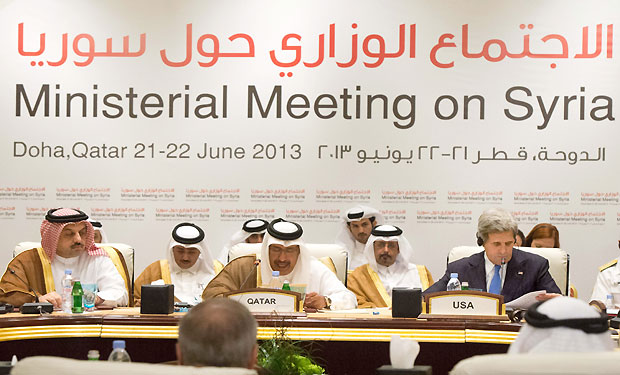
Qatari Prime Minister and Foreign Minister Hamad bin Jassim bin Jabr Al-Thani (C), US Secretary of State John Kerry (R) and Qatari Minister of State for Foreign Affairs Khalid bin Mohamed Al-Attiyah (L) attend the ministerial meeting on Syria, in Doha, Qatar, on June 22, 2013. (EPA/Maurizio Gambarini)
London, Asharq Al-Awsat—Foreign ministers of the Friends of Syria group, meeting earlier today in Qatar, have defended arming Syrian rebels fighting the Bashar Al-Assad regime.
The Friends of Syria—comprised of Britain, Egypt, France, Germany, Italy, Jordan, Qatar, Saudi Arabia, Turkey, the UAE and the USA—met in Doha earlier today to tighten coordination of their support for the Syrian rebels.
The Qatari prime minister, Sheikh Hamad bin Jassim bin Jaber Al-Thani, stressed that “force is necessary to achieve justice, and the provision of weapons is the only way to achieve peace in Syria’s case.”
“We cannot wait due to disagreement among [UN] Security Council members over finding a solution to the problem,” the Qatari prime minister emphasized. Sheikh Hamad bin Jassim also called on Beirut to put an end to Hezbollah’s interventions in Syria.
US secretary of state John Kerry agreed that the Syrian rebels need more support “for the purpose of being able to get to Geneva and to be able to address the imbalance on the ground.”
“The United States and other countries here—in their various ways, each choosing its own approach—will increase the scope and scale of assistance to the political and military opposition,” Kerry added.
Reuters quoted a number of Syrian and Arab sources who revealed that the provision of advanced arms to Syria has been stepped up over the past week. A Gulf source described the supplies as “potentially balance-tipping.”
For his part, rebel spokesman Louay Meqdad confirmed that the Supreme Military Council, led by former Syrian army general Salim Idriss, had received several new batches of weapons.
“They are the first consignments from one of the countries which support the Syrian people and there are clear promises from Arab and foreign countries that there will be more during the coming days,” he told Reuters Television in Istanbul.
The US Secretary of State also accused Assad of “internationalizing” the crisis, by embroiling Iran and Hezbollah in the conflict that has been raging in Syria for over two years. Kerry emphasized that Assad had allowed Iranian and Hezbollah fighters “to cross the lines from Lebanon and engage in the fight on the ground”.
“Reliable civilian governance and a stronger and more effective armed opposition will better enable the opposition to be able to provide the counterweight to the initiative of Assad,” Kerry said.
Speaking ahead of the meeting, British foreign secretary William Hague said that his government had yet to take any decision on providing arms to the Syrian rebels.
“On the much-debated question of whether we should give lethal aid of any kind to the Syrian opposition, the position remains the same—we have taken no decision to do that,” he told reporters in Doha.
“At the end, there is only a political solution for the conflict. We want to see a successful conference in Geneva,” Hague added.
